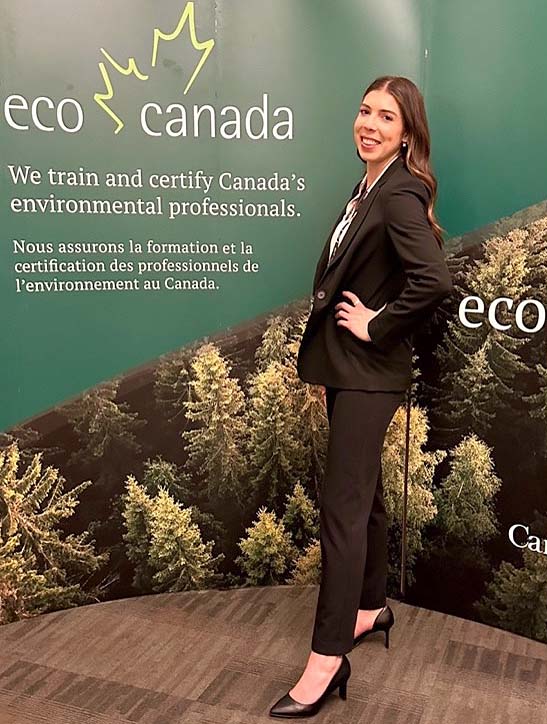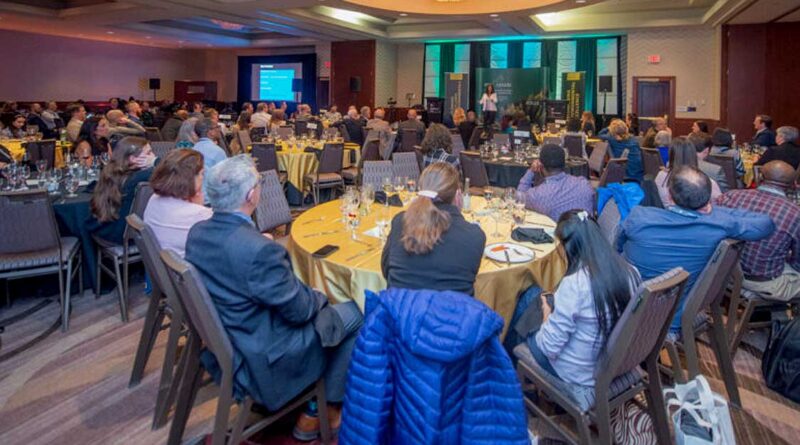So Much To Learn
By Jocelyn Trudell – Special to SUNonline/Orillia
My journey into the realm of sustainability took an extraordinary turn with an opportunity facilitated by ECO Canada’s Science and Horizons Program funded by Environment and Climate Change Canada. As an intern with Sustainable Orillia, I found myself delving deeper into environmental stewardship, seeking to make tangible contributions to our community and the planet at large. Little did I anticipate that this journey would lead me to the vibrant city of Calgary for the 2024 ECO Impact Conference – an event of paramount sustainability significance.
The conference served as a convergence point for industry leaders, innovators, and enthusiasts, providing a platform to exchange ideas, foster collaboration, and explore sustainable solutions. Over two days, attendees engaged in innovative discussions, forged valuable connections through networking, and celebrated the efforts of environmental professionals nationwide.
In an era marked by environmental challenges, the gathering of industry leaders and innovators served as a beacon of hope, showcasing the collective dedication and ingenuity required to address pressing environmental issues.

As part of this conference I expanded my knowledge and network, and contributed to a larger movement aimed at fostering a more sustainable future for generations to come. As an aspiring environmental professional, this experience was enriching and imperative to shaping my understanding and commitment to environmental stewardship.
I found myself immersed in a whirlwind of discussions, presentations, and insights aimed at unravelling the complexities of Canada’s journey toward achieving Net Zero emissions.
The opening plenary session, Unite for Change: Bridging Perspectives for a Sustainable Future, had panelists from diverse backgrounds talking about the importance of being innovative about protecting our environment. They stressed the need for everyone to understand their role in taking care of the planet, whether it’s through conservation efforts or just being more mindful of how we use our natural resources. One topic was greenwashing – companies trying to appear more environmentally friendly than they actually are. We need to be on the lookout for these kinds of tactics.
During the Zero Revolution session, we explored the dynamic realm of transforming medium and heavy-duty fleets to prioritize sustainability. Seasoned experts and forward-thinkers illuminated the discussion with innovative concepts, including vehicle downsizing, hybrid technologies, and pioneering experiments with hydrogen fuel cells.
Notably, the Alberta Zero Emission Hydrogen Transit project emerged as a beacon of promise, showcasing the potential of hydrogen fuel cell electric buses. These buses will undergo rigorous road trials across municipalities such as Edmonton, Strathcona County, Calgary, and Banff/Bow Valley. With a positive outcome this initiative promises to kickstart the demand for hydrogen and facilitate the establishment of economically viable fuelling stations and distribution networks province-wide.
Edmonton, renowned for possessing the largest municipal vehicle fleet in Canada, astounded attendees with their strategic management approaches and seamless transition to an eco-friendlier fleet. They unveiled their winning strategies, including vehicle downsizing and driver awareness programs. By educating drivers on idling and acceleration, they achieved substantial reductions in carbon emissions and even accrued significant cost savings of a staggering $1 million. It’s clear going electric is just the beginning when it comes to revolutionizing our transportation systems for a greener future.
The Planning for Climate Change session focused on addressing the significant challenges posed by climate change. During the session, various solutions were discussed, including strategies to reduce greenhouse gas emissions and enhance the cleanliness of our energy grid.
An important topic was energy poverty, in which individuals struggle to afford necessary energy. This issue presents significant challenges, but there are actionable steps we can take to alleviate them. For instance, in Orillia, there’s a program supported by organizations like IESO and Enbridge that provides free energy upgrades to eligible households.

During the conference, the importance of collaboration as a driving force behind environmental innovation became evident. Panel discussions highlighted the significant role of government intervention to promote innovation with various incentives, programs, and regulatory frameworks.
It was stressed that municipalities play a crucial role in addressing environmental challenges and should capitalize on available grants to tackle these issues effectively. Moreover, inclusive engagement was underscored, emphasizing the importance of considering diverse perspectives to ensure that environmental solutions meet the needs of all stakeholders, including indigenous communities who possess valuable traditional knowledge of the lands.
Reflecting on the diverse insights and discussions at ECO Impact 2024, I am struck by the intricate path toward achieving Net Zero emissions. While Canada trails behind other G7 nations in reducing emissions, many countries have made significant strides in curbing emissions, with even the US making progress toward 1990 levels. Canada is still grappling with a 16% increase in emissions since 1990, according to the latest Early Estimates of National Emissions of the Canadian Climate Institute.
Nevertheless, amidst these challenges, there are ample opportunities for innovation, collaboration, and transformative change.
(Images Supplied) Main: 2024 Eco Can Conference attendees.




